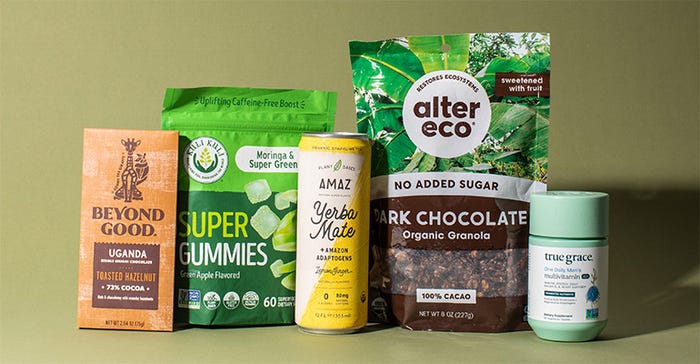
There is no one-size-fits-all solution for ways that brands can have a climate-positive impact, but a common denominator is, or at least should be, transparency. Consumers support brands that honestly measure and display their sustainability roadmap and the steps they are taking toward positive change. Brands leading the way tackle sustainability at each point in a product’s lifecycle: efficient packaging, upcycling materials, reducing carbon emissions and creating close supplier relationships.
For the June/July/August issue, NFM asked four experts representing different sustainability spheres and organizations to contribute their insights on sustainability and how retailers and brands can make real, measurable progress.
HowGood’s perspectives on sustainability are based on transparency and regeneration throughout the supply system and are measured with our ingredient-level sustainability intelligence platform, Latis.
This platform is powered by the world’s largest ingredient and product sustainability database, which aggregates information from over 550 unique data sources, including peer-reviewed research, industry findings and government and non-governmental organizations. With that data, players across the supply system can evaluate product portfolios against more than 250 environmental and social sustainability metrics and attributes. Latis helps brands and retailers understand, improve and report on their impact in an easy-to-digest way while maintaining granular and comprehensive assessment.
It’s critical for retailers to keep their corporate ESG goals front of mind and make sure that all activities, including evaluating brand partners, reflect their overarching goals. This provides retailers a more targeted strategy and allows them to be focused on factors that will ultimately drive progress and results, especially as consumers increasingly demand transparency and action.
How retailers can quantify climate impact

An estimated 70%-90% of a product’s impact occurs before the ingredient leaves the farm. That means retailers and brands can be fully accountable for sustainability claims only when they have transparency down to the ingredient level in their supply and value systems and make sourcing decisions accordingly.
It’s important for retailers and brands to create an internal sustainability framework that is dynamic, easy to manage and offers opportunities to improve and take action. Without a system in place to facilitate ongoing monitoring and evaluation of sustainability metrics, maintaining accountability is a huge challenge.
Until recently, highly granular data insights at the ingredient level to support this kind of framework have been unavailable, but we are making them readily available to brands and retailers and ready to communicate to the consumer.

Sustainable supply ecosystems
Shared sourcing, creating long-term supply relationships, and working directly with farmers and their communities are just some ways brands can form deep, real relationships with suppliers that, in turn, can help mitigate risks and increase resilience in the face of climate change.
Beyond Good Toasted Hazelnut Chocolate Bar
Made of single-origin cocoa from Uganda, this 73%-cocoa bar is Direct Trade Certified and Non-GMO Project Verified. The brand’s business model and supply chain is comprised of 93 farmers who sell their cocoa at premium prices directly to Beyond Good, which then produces the chocolate at origin in its factory in Madagascar. SRP: $4.50
Kuli Kuli Moringa and Super Greens Super Gummies
This B Corp partners directly with family farmers and women’s cooperatives to implement regenerative agriculture practices and create a sustainable supply chain based on climate-hardy moringa. These yummy gummies contain 200 milligrams of moringa leaf powder, along with a Super Greens Blend of 11 leafy greens. SRP: $24.99
Amaz Lemon Ginger Organic Sparkling Yerba Mate
This USDA Organic RTD beverage relies on a proprietary blend of wellness-supporting adaptogens and superfoods including Yanomami mushrooms and suma root. The brand donates 2% of all sales to the non-profit Xingu Seeds Network to collect tree seeds and redistribute them to restore the ecosystems in the Brazilian Amazon. SRP: $2.79
Alter Eco Dark Chocolate Organic Granola
This organic cereal uses regeneratively farmed oats that are mixed with 100% cacao, coconut oil, date powder and monk fruit. Packaged in a post-consumer recycled pouch, the product represents part of this B Corp’s ongoing mission to fight climate change on a variety of fronts: direct trade, promoting agroforestry and more. SRP: $7.49
True Grace Men’s 40+ Multivitamin
Though the brand is new, the principals are industry veterans. In partnership with enlightened longstanding suppliers, True Grace brings certified organic, non-GMO, and now regenerative ingredients to market. This creates supply chains that are more resilient to climate pressures while elevating trust and transparency to the industry. SRP: $51.95/60 tablets
About the Author(s)
You May Also Like
.png?width=700&auto=webp&quality=80&disable=upscale)




